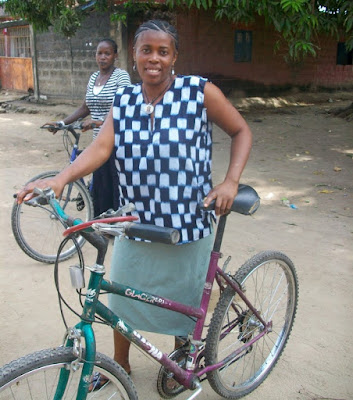 |
| Bikes in Honduras |
This weekend a new film by Saudi filmmaker Haifaa Al Mansour opens in the DC area.
Wadjda tells the story of a girl of the same name who wants to buy a bicycle to race a boy in town.
Problem is girls don't ride bikes and they don't intermix with boys...not in Saudi Arabia. That goes for women too, but here we have a female filmmaker shooting the first full length film in a country that doesn't even have movie theaters. If that's not a persistent woman pursuing a dream we don't know what is!
In a recent interview with Haifaa Al Mansour she speaks of growing up in Saudi Arabia and feeling invisible. She was simply trying to find a voice and in doing so gave one to Wadjda, an 11 year old girl who just wants to ride a bike. But it's never
just about the bike.
 |
| Sierra Leone courtesy Village Bicycle Project |
Obstacles facing women and young girls is something we hear a lot from our partners overseas. In fact, many of our partners make it a priority to empower women specifically.
Village Bicycle Project (VBP) in Ghana and Sierra Leone target girls in their riding clinics and mechanic classes. When they first started working with girls they noticed that when they gave them bicycles the boys would steal the bikes from them.
To overcome this road block VBP first gave boys bikes and simply taught the girls how to ride. That way they could borrow their brothers bikes and continue honing the skill.
Another solution was the establishment of the Learn 2 Ride Bicycle Library in Sierra Leone. It works a lot like a regular library, loaning bikes to girls for the semester so they can get to and from school. VBP is then responsible for the maintenance of the bikes. They found that if the bikes were on loan, the male family members did not take over the bike.
 |
| Adamsay with loaned bike courtesy VBP |
The big downside of the library model? VBP Director Dave Peckham expressed concern that unfortunately when the girls go on to college they are no longer riding bicycles.
Meg Watson, also of VBP, pointed out, "I can't feel too bad about this, as it means the girls we invested in are in college!!"
Bikes for the Philippines also loans bikes to students to help them stay in school, but upon graduation they earn the bike outright. They also had several girls complete the program and go on to college. No word on whether they took their bikes to school with them.
 |
| Zoila courtesy ChildFund |
Bikes for the World's newest partner in Mozambique is ChildFund International. ChildFund works in 31 countries and exists to help deprived, excluded and vulnerable children have the capacity to improve their lives and the opportunity to become young adults, parents and leaders who bring lasting change in their communities.
Many of their priorities are also focused on women and girls. They are empowering women through savings and loans and small businesses initiatives and by providing life skills for youth, particularly women.
“I advise my sisters and brothers that we have to think of our future. We can do many good things, but sometimes we think of marriage as a first option, but it is not the most important because we are still very young.” -Zoila, 15
 |
| Hirabai Courtesy Jake Lyell Productions |
Young girls have the added hardship of social expectations that keep
them in the homes caring for younger siblings and contributing to house
chores. Walking long distances over rural roads also brings danger and
insecurity forcing many girls to drop out of school.
ChildFund's Dream Bikes program is bring bikes to students like Hirabai (far right) in India. In India we hear very similar stories to those coming from our education project in Bohol, Philippines.
 |
| Courtesy Jake Lyell Production |
Many students live 3km or more from school and struggle to arrive on time every day. If they are late they are kept out of the morning classes, missing many lessons.
Many of these same obstacles exist for girls around the world. In Mozambique, ChildFund points to evidence that states girls whose families have a bicycle and use it for chores have 32% higher probability of staying in school than girls in rural areas who do not have a bicycle.
Bikes for the World sent an initial shipment to
ChildFund Mozambique just this week. Bikes collected at recent collections with Ann Jackson and Friends,
Pedal Pushers, and Falls Church Recycling, in addition to bikes we received this summer from
DICK'S Sporting Goods were included in the shipment of 500 bikes.
Here, Outreach Coordinator Yvette Hess hands a bike to Daniel Richard of the Pentagon Area Junior Petty Officers Association. The bike was donated by Margaret McEvoy of NW DC and is now on it's way to Mozambique.
In addition to the Sailors who helped finish the load we were joined by a corporate team building group from IBM who loaded over half the container the day before. We hope to hear great things coming from this project (and possibly more countries!) from ChildFund in the near future. Please follow our progress (and theirs) on
Facebook.
























































